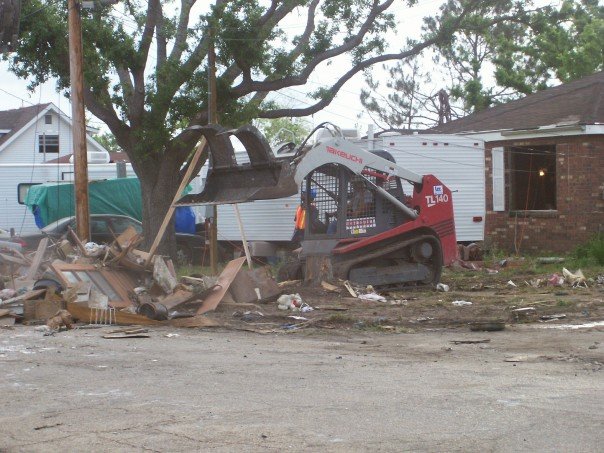North State Voices: Tears sometimes can be tears of hope
By Joanna O’Hanlon
Posted: 06/13/2013 01:44:23 AM PDT

Her name was Rosemary, but we called her Miss Rose.
We were sitting on what was left of her back porch, wearing Tyvek suits. We were marinating in the day’s spent energy from sweat-filled hours of shoveling thick silt and mud out of her hurricane-damaged home near New Orleans. And as we shoveled, we had been fishing through, searching for possessions and making three piles — “possibly salvageable,” “not salvageable but possibly sentimental” and “trash.”
Even the trash pile was full of possessions that once made up a life.
Miss Rose was one of the 275,000 people whose homes were ravaged by Hurricane Katrina in August 2005. When our church team came to participate in relief work seven months later, we all fell in love with the sweet, frail yet strong-hearted, 88-year-old widow.
Like ignorant tourists going into the Holy of Holies, we were unaware of the sacred space we were about to enter — unaware of how intimate a thing it is to gut out someone’s home with shovels and wheelbarrows.
“They wanted to do something kind for me,” Miss Rose began her story about the mud-caked play-jewelry in her hand, a gift from her children many years before. One of us had just pulled it from a block of mud. It was a broken, multi-colored pop-bead necklace.
“My children and I always went Christmas shopping on my birthday. But, you know, they were children, so they never got anything for my husband or I,” she said.
She continued, telling the story of how her boys had conspired to get her a gift and asked her if they could shop alone. They had come back, their faces proudly beaming, to present her with the very dime-store necklace she now held in her hand.
We also learned that one of those sons had since passed away. The love and the pain of remembering this moment all brimmed at the edges of her misty blue eyes as she clenched the muddy plastic.
We had almost just thrown it in the trash pile. I believe it did end up there, but before it did, it was a temporary portal for Miss Rose to recall the sweetness of her young sons one more time after decades of holding on to this priceless dime-store jewelry.
Through the sorting of her ruined possessions, Miss Rose shared her life with us.
One day in the week, upon arriving at the house, we had to wait for a dump truck that was slowly moving along the street, picking up the piles of debris that people had begun to place in front of the houses. Most of us were excited by this because we had needed our “trash” pile cleared for a few days and we’d been told it could take weeks to be cleared. We were stripping the house bare, and we needed room for the rest of the debris.
But one woman on our trip — a woman who has children and grandchildren of her own, and knows what it takes to build a life — did not participate in our excitement. “I can’t imagine how hard it must be to see your whole life scooped into a dump truck,” she said softly. “I can’t imagine how painful …”
That was the dichotomy of our week with Miss Rose — it’s the dichotomy of all who have to grieve a loss and move on. There is such pain and sadness in remembering things past and having to let go. I can’t imagine seeing my life tossed mechanically into a dump truck. But to rebuild requires the removal of debris.
While I saw many tears fall from Miss Rose’s eyes throughout the week, at the end, when her house was completely gutted, with only bare studs and power-washed concrete flooring left, there were tears in her eyes as she smiled and hugged each of us. I believe some were tears of sadness, some of grace, and some, I am certain, were tears of hope.
For those in the areas that have been affected recently by tornadoes, this is my prayer. That their tears of loss will become intermingled with tears of hope for rebuilding.
Joanna O’Hanlon is an Oroville resident and columnist for North State Voices, which appears each month on www.orovillemr.com